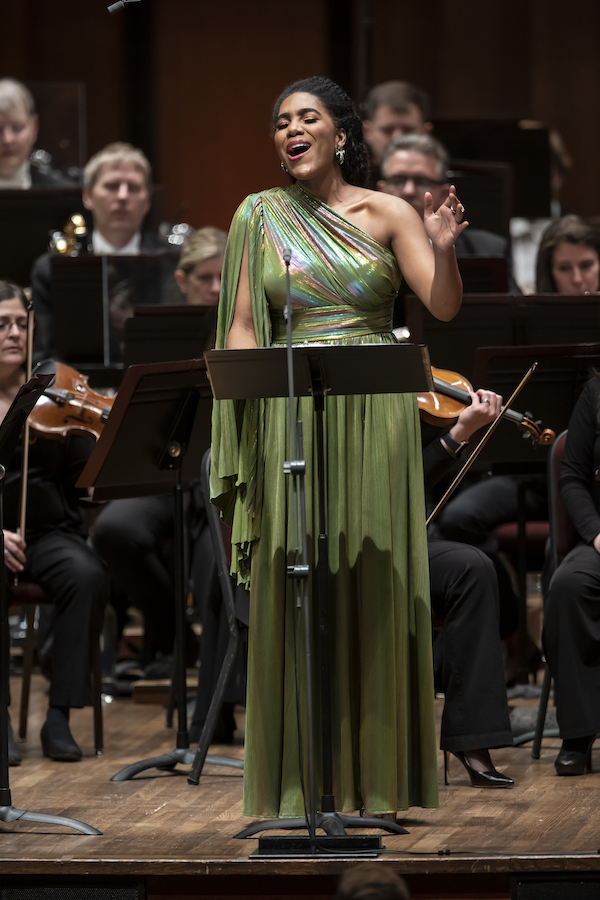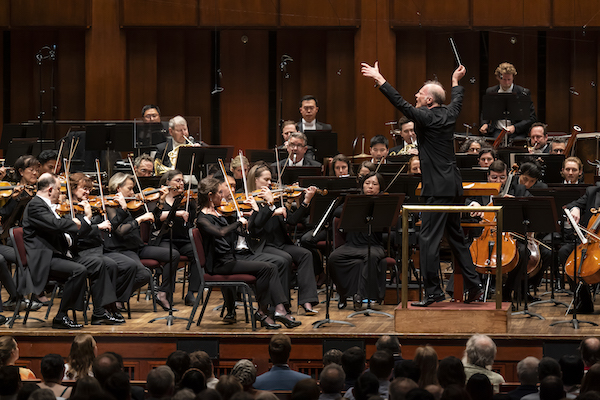Back from Carnegie, Noseda & NSO return with dynamic program and world premiere

J’Nai Bridges performed Berio’s Folk Songs and the world premiere of Carlos Simon’s Songs of Separation with the NSO Friday night. Photo: Scott Suchman
Gianandrea Noseda and the National Symphony Orchestra came home this week, fresh off an acclaimed appearance at Carnegie Hall Tuesday night. The ensemble dove straight into a new program, heard for the first time Friday evening in the Kennedy Center Concert Hall. Even after delaying their usual weekend schedule by a day, the orchestra still put this excellent program together with one fewer rehearsal than normal.
Nearing the end of his sixth season as music director, Noseda continues to offer surprising selections of music. The NSO plays plenty of meat-and-potatoes fare, but some of the menus are much more unexpected, like this one. Noseda wrapped two 19th-century classics around a pair of modern song cycles at the concert’s heart, all coming together around themes of tragic love and exotic folk music.
Suite No. 1 from Edvard Grieg’s incidental music for Ibsen’s play Peer Gynt set the stage with suitable color. Delicate accompaniment from the orchestra clothed placid solos from flute and oboe in the opening “Morning Mood.” Noseda caressed the little odd harmonic tints in “The Death of Åse,” featuring a gloomy, hushed string sound to accompany the last breaths of Peer Gynt’s mother.
Soft triangle dings tinged the alternation of pizzicato and bowed sound from the strings in the exotic “Anitra’s Dance,” set during Peer Gynt’s wanderings in north Africa. The swirling accelerando of “In the Hall of the Mountain King” could perhaps have been more unified, but the sense of the protagonist’s fever dream came across clearly.
Noseda is a champion of Luciano Berio’s music, and had programmed this compatriot’s enigmatic Folk Songs back in 2019, which was canceled when the singer had to withdraw. Berio composed this cycle, arrangements of folk songs from around the world, for Cathy Berberian, the American mezzo who was his muse (and wife, for a time). The NSO played Berio’s 1973 orchestral version of the piece, originally written in 1964 for a chamber ensemble.

Gianandrea Noseda conducted the NSO in a program that included works of Grieg and Tchaikovsky at the Kennedy Center Friday night. Photo: Scott Suchman
Mezzo-soprano J’Nai Bridges provided one of the last vocal thrills before the Covid shutdown, with her blazing Washington National Opera debut in Samson et Dalila. She applied the many gorgeous facets of her voice to this Technicolor piece, ardently so in the two opening American songs, actually composed by folk music collector John Jacob Niles. Her musicality shone through as she maintained rhythmic independence in the fast “Rossignolet du bois,” and her chest voice resonated with male strength in the Sicilian song “A la femminisca.”
The NSO musicians wove the set together with the dissonant instrumental flourishes of Berio’s memorable score, which opened with paired solo violas. Stark soundscapes with harp and various percussion instruments stood out, in the Sardinian song “Motettu de tristura,” among others. Bridges opened up vocally in the final two songs, with ecstatic roulades in “Lo fiolaire” and the upbeat romp of the puzzling Azerbaijan love song that rounds out the work.
After channeling Cathy Berberian, Bridges went on to give the world premiere of Songs of Separation, a new song cycle commissioned by the NSO from Carlos Simon and written specifically for her. A reaction to the separations occasioned by the pandemic, the piece sets four rather banal poems by Coleman Barks, loosely based on earlier translations of texts by the 13th-c. Sufi mystic Rumi, but shorn of all Islamic religious context.
Simon’s music, however, raised these platitudes to a striking level of sincerity. Exotic tinges of percussion and sinuous flute melodies set the tone in “The Garden,” accompanied by a huge orchestral crescendo. Blaring brass over a tense drumbeat signaled the horrible contradictions of “Burning Hell,” with breathless narration related over a lop-sided 5/4 meter. Bridges rose in volume to a shattering wail at the end, as she repeated the words “It’s a burning hell.”
The last two songs washed away this moment of pain, with Broadway-style orchestral sweep in “Dance,” in which Noseda had to carefully balance the soloist with the orchestra. An echt pops concert broke out at the conclusion of the final song, “We Are All the Same,” when the sounds of a drum kit percolated behind the repeated final line, “Back to the one, back to the only one.” For Simon, born in Washington and raised in Atlanta as a preacher’s son, the cycle evoked the drama of a Gospel church service.
Tchaikovsky’s Fantasy-Overture Romeo and Juliet rounded out this dynamic and varied concert. After the somber opening, on chant-like music representing Friar Laurence, flute and harp joined with the lush string section for the lovers’ exultant theme. The music for the warring families crackled with heated violence, and Noseda’s interpretation mostly did not allow much space for expressive rubato. Until the end, that is, when the apotheosis of the young lovers’ music offered a sweet benediction.
The program will be repeated 8 p.m. Saturday and 3 p.m. Sunday. The Sunday matinee will be livestreamed on medici.tv. kennedy-center.org

